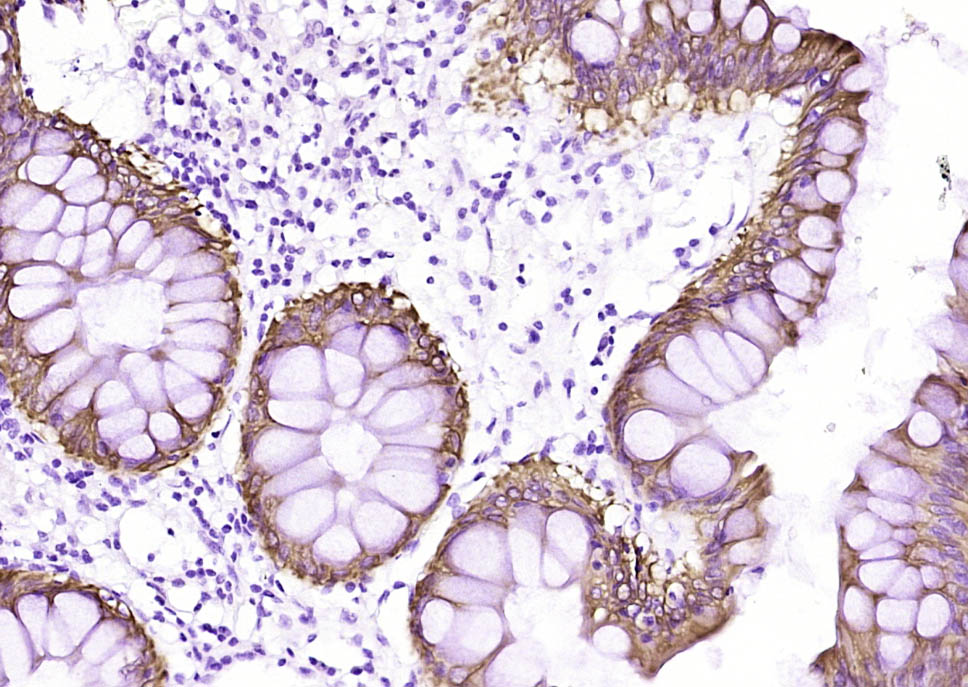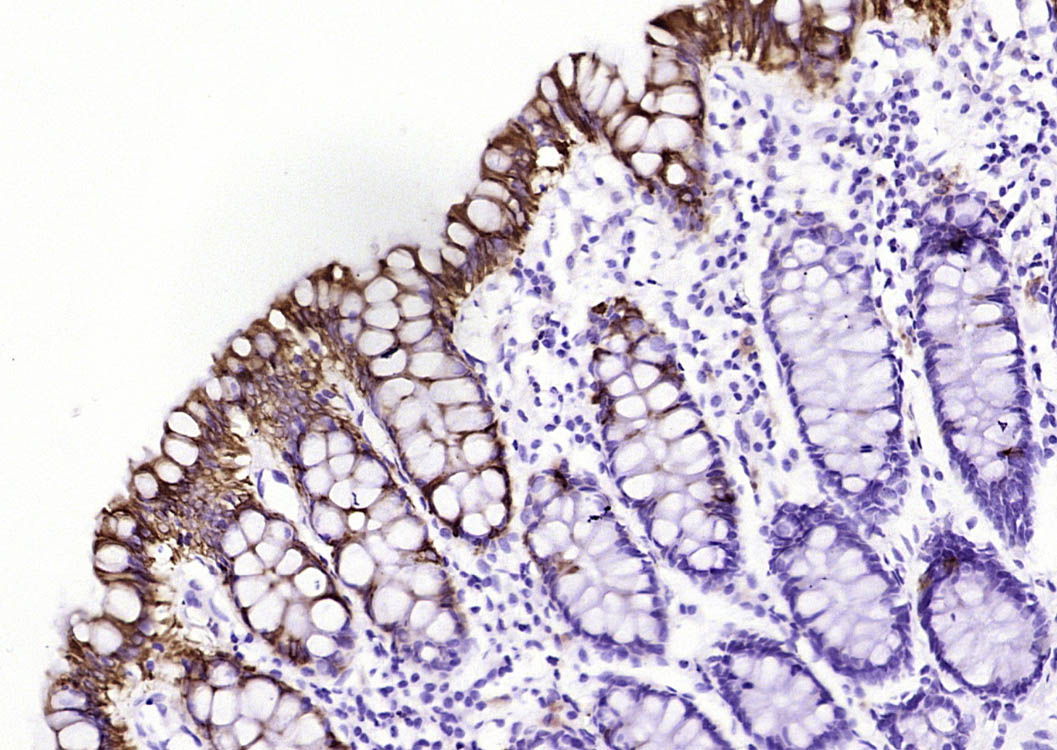
Mouse Anti-CK20(ready to use)antibody (BH0221)
Cytokeratin 20; CK 20; CK20; Cytokeratin20; K20; Keratin 20; Keratin type I cytoskeletal 20; Keratin20; KRT 20; KRT 21; KRT20; KRT21; MGC35423; Protein IT; K1C20_HUMAN.
View History [Clear]
Details
Product Name CK20(ready to use) Chinese Name 细胞角蛋白20单克隆抗体(工作液) Alias Cytokeratin 20; CK 20; CK20; Cytokeratin20; K20; Keratin 20; Keratin type I cytoskeletal 20; Keratin20; KRT 20; KRT 21; KRT20; KRT21; MGC35423; Protein IT; K1C20_HUMAN. Research Area Tumour immunology Immunogen Species Mouse Clonality Monoclonal Clone NO. 6A12 Applications IHC-P=1:100-500 IHC-F=1:100-500 ICC=1:100-500 IF=1:100-500 (Paraffin sections need antigen repair)
not yet tested in other applications.
optimal dilutions/concentrations should be determined by the end user.Theoretical molecular weight 48kDa Cellular localization cytoplasmic Form Liquid immunogen KLH conjugated synthetic peptide derived from human CK20 Lsotype IgG2a Purification affinity purified by Protein G Buffer Solution 0.01M PBS(pH7.4) with 1% BSA and 0.1% Proclin300 Storage Store at 2-8 °C for one year. Avoid repeated freeze/thaw cycles. Attention This product as supplied is intended for research use only, not for use in human, therapeutic or diagnostic applications. PubMed PubMed Product Detail Cytokeratin 20 is a type I keratin which is primarily expressed in gastric and intestinal epithelium, urothelium, and Merkel-cells. The keratins are intermediate filament proteins responsible for the structural integrity of epithelial cells and are subdivided into cytokeratins and hair keratins. The type I cytokeratins consist of acidic proteins which are arranged in pairs of heterotypic keratin chains. Their genes are clustered in a region of chromosome 17q12-q21. Cytokeratin 20 is a major cellular protein of mature enterocytes and goblet cells and is specifically expressed in the gastric and intestinal mucosa. It is also expressed in adenocarcinomas of the colon, stomach, pancreas and the bile system and is present in mucinous ovarian tumors, transitional-cell and Merkel-cell carcinomas. Notably, the squamous cell carcinomas and adenocarcinomas of the breast, lung, and endometrium, non-mucinous tumors of the ovary, and small cell carcinomas lack cytokeratin 20.
Function:
Plays a significant role in maintaining keratin filament organization in intestinal epithelia. When phosphorylated, plays a role in the secretion of mucin in the small intestine (By similarity).
Subunit:
Heterotetramer of two type I and two type II keratins. Associates with KRT8.
Subcellular Location:
Cytoplasm.
Tissue Specificity:
Expressed predominantly in the intestinal epithelium. Expressed in luminal cells of colonic mucosa. Also expressed in the Merkel cells of keratinized oral mucosa; specifically at the tips of some rete ridges of the gingival mucosa, in the basal layer of the palatal mucosa and in the taste buds of lingual mucosa.
Post-translational modifications:
Hyperphosphorylation at Ser-13 occurs during the early stages of apoptosis but becomes less prominent during the later stages. Phosphorylation at Ser-13 also increases in response to stress brought on by cell injury (By similarity).
Proteolytically cleaved by caspases during apoptosis. Cleavage occurs at Asp-228.
Similarity:
Belongs to the intermediate filament family.
SWISS:
P35900
Gene ID:
54474
Database links:Entrez Gene: 54474 Human
Entrez Gene: 66809 Mouse
Omim: 608218 Human
SwissProt: P35900 Human
SwissProt: Q9D312 Mouse
Unigene: 84905 Human
Unigene: 28042 Mouse
Unigene: 9887 Rat
Product Picture
Partial purchase records(bought amounts latest0)
No one bought this product
User Comment(Total0User Comment Num)
- No comment




 +86 571 56623320
+86 571 56623320




